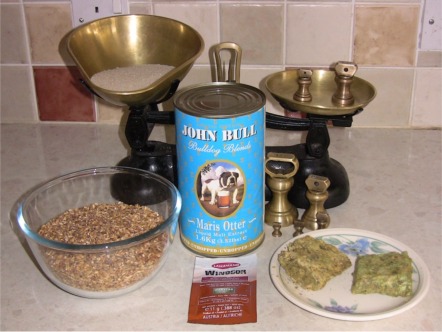Ingredients for Extract Brewing

Malt Extract
This can be in the form of liquid malt extract (LME) or dried malt extract (DME), and is available in light, medium and dark varieties, hopped and unhopped; which you use depends on the beer style you are aiming for. The extract will form the bulk of the sugar for the subsequent brewing process. It's best to use un-hopped extract in my opinion, as buying it ready-hopped reduces your options - you might as well buy a good beer kit instead and save yourself all the hard work.
Grains
Grains to be used in extract brews are those that do not require 'mashing' (the process used in all-grain brewing). These are collectively known as 'speciality grains'. Adding grains is optional, and can be regarded as an enhancement of basic extract brewing. Speciality grains need to be steeped in hot water for 30 minutes before boiling the extract with the hops.
Grains you can use:
Caramel Malts (e.g. Crystal Malt), Roasted Malts (e.g. Black Malt, Chocolate Malt), Roasted Barley.
Grains to avoid:
Base Malts (e.g. Pale Malt, Wheat Malt), Kilned Malts (e.g. Munich Malt, Vienna Malt), Adjuncts (e.g. Flaked Barley, Flaked Rice).
Sugar
For economy, household sugar can be used to raise the strength of the beer without having to use more expensive malt extract. However, I would not recommend using too much, as the beer is thinner and has poorer flavour if too much sugar is added. If you do decide to add sugar, it's worth experimenting with different types, e.g. dark sugars like muscovado, soft dark brown sugar, or using treacle or molasses to get a variety of different flavours. If you're using something with a very strong flavour of its own (e.g. molasses) introduce them in small proportions at first, while you find out how they affect the flavour in the finished beer.
Hops provide the bitterness in the beer that balances the sweetness of the malt. There are dozens of varieties and you can use any hop or combination of hops that you like to produce a beer that tastes the way you want it. If you are using hopped extract, you can omit the hops (though unless you use speciality grains or add late hops for aroma, you might as well make up a beer kit!)
The hops should be boiled in the wort for at least 60 minutes to extract the bitterness; however hops can also be added later to provide flavour and aroma. Some extract brewers increase the amount of hops drastically and use a 'short boil' of as little as 15 minutes - Google will tell you all about it, but a word of warning; hops are expensive and this method uses them very inefficiently. Using a full-length boil will get you the same level of bitterness from far fewer hops, and you can still restore flavour and aroma by using a relatively small quantity of quality late hops.
Yeast
Yeast converts the sugar from the malt into alcohol. There are many strains available to the home brewer and using a good yeast compatible with the beer style can enhance the quality of your beer.
Water
Even strong beers are over 90% water, so it's important to ensure your water is suitable for brewing (don't worry though, as most tap water in the UK and other developed countries is perfectly suitable for brewing). Have a look at the section on basic water treatment in 'Extras' to get an idea of what tweaks you can do to improve your water.
Copyright Information: This site designed by Jim Dunleavy

